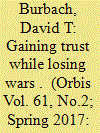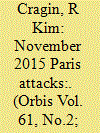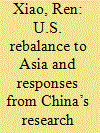|
|
|
Sort Order |
|
|
|
Items / Page
|
|
|
|
|
|
|
| Srl | Item |
| 1 |
ID:
155262


|
|
|
|
|
| Summary/Abstract |
During unpopular wars in Iraq and Afghanistan, the American public’s confidence in the U.S. military surprisingly rose to all-time highs. Confidence had been thought closely linked to battlefield success, so that increase was unexpected, and very unlike the crisis of confidence after Vietnam. Confidence can be better understood considering four dimensions: performance, professionalism, partisanship, and patriotism. The military has kept the public’s trust in part because, despite disappointing outcomes, it has not suffered organizational and professional breakdowns as happened after Vietnam. In addition, in the post-conscription era, expressing “confidence” is a low-cost way for disconnected citizens to express gratitude—even if they largely disagree with military preferences. Finally, a wide partisan confidence gap opened after 2003, suggesting that confidence increasingly reflects political identities rather than objective assessment of the state of the military.
|
|
|
|
|
|
|
|
|
|
|
|
|
|
|
|
| 2 |
ID:
155267


|
|
|
|
|
| Summary/Abstract |
Modern society depends on satellites in space, and the United States relies on satellites more than any other country. It is from space that much of America’s military advantage is assured. Without the satellites that link our forces together, America’s modern military would cease to function and would risk being overwhelmed. However, U.S. space architecture is more vulnerable to attack than ever. The longer America’s satellites remain undefended, the more likely those systems will be vulnerable to hostile attack. This article addresses a better way to defend these vital systems by advocating a policy of “space dominance,” as opposed to “space superiority.” Space Dominance is the only way that the United States will preserve its status as the most powerful country in the world.
|
|
|
|
|
|
|
|
|
|
|
|
|
|
|
|
| 3 |
ID:
155263


|
|
|
|
|
| Summary/Abstract |
This article examines the “framing” strategies employed by the Islamic State in espousing the group’s salafist-takfiri doctrine, which includes the call for both defensive and offensive jihad. An analysis of the written documents, official statements and social media messaging issued by the Islamic State reveals three main framing strategies upon which the organization grounds its security claims. First, diagnostic frames are intended to highlight the threats that exist to its extreme vision of Islam. Second, prognostic frames offer prescriptions for meeting those threats. And, third, motivational frames are designed to mobilize active support for the Islamic State and its doctrine. This means that ultimate victory over the Islamic State requires that moderate Sunni Muslim religious and political elites offer both a credible counter-narrative that debunks the doctrinal vision of the Islamic State and an alternative doctrinal narrative that addresses the hopes, needs and concerns of young Muslims.
|
|
|
|
|
|
|
|
|
|
|
|
|
|
|
|
| 4 |
ID:
155264


|
|
|
|
|
| Summary/Abstract |
The Islamic State has severe limits and poses a manageable problem. Its limits include that it is unable to occupy ordered areas or Shiite areas. The Islamic State’s military capability and its ability to govern territory are modest. It collaborates poorly with like-minded organizations and it has elicited a military response from countries, reducing its territory and imperiling its existence.
|
|
|
|
|
|
|
|
|
|
|
|
|
|
|
|
| 5 |
ID:
155266


|
|
|
|
|
| Summary/Abstract |
This article provides an in-depth analysis of the role of foreign fighter returnees in the attacks by the Islamic State in Iraq and Syria (ISIS) in Western Europe. To do this, it focuses primarily on the operatives and logisticians responsible for the November 2015 attacks in Paris. The threat from foreign fighter returnees remains under-appreciated in expert and policymaking communities. ISIS’s rhetorical emphasis on the caliphate, combined with a series of attacks by lone actors, has made it easy for policymakers to misinterpret ISIS’s true intentions against the West. This case study illustrates that ISIS leaders have been able to plan and execute parallel strategies within the Middle East (Islamic caliphate) and Western Europe (terrorist campaign). Moreover, they have pursued these parallel strategies through using foreign fighters.
|
|
|
|
|
|
|
|
|
|
|
|
|
|
|
|
| 6 |
ID:
155265


|
|
|
|
|
| Summary/Abstract |
This article provides an in-depth analysis of the role of foreign fighter returnees in the attacks by the Islamic State in Iraq and Syria (ISIS) in Western Europe. To do this, it focuses primarily on the operatives and logisticians responsible for the November 2015 attacks in Paris. The threat from foreign fighter returnees remains under-appreciated in expert and policymaking communities. ISIS’s rhetorical emphasis on the caliphate, combined with a series of attacks by lone actors, has made it easy for policymakers to misinterpret ISIS’s true intentions against the West. This case study illustrates that ISIS leaders have been able to plan and execute parallel strategies within the Middle East (Islamic caliphate) and Western Europe (terrorist campaign). Moreover, they have pursued these parallel strategies through using foreign fighters.
|
|
|
|
|
|
|
|
|
|
|
|
|
|
|
|
| 7 |
ID:
155269


|
|
|
|
|
| Summary/Abstract |
Russian President Vladimir Putin believes that offense-dominant military practices hold significant advantages in contemporary interstate conflict. Either through non-linear means or through the use of advanced conventional weaponry, the Russian Federation has begun to act as if those who attack first and decisively have the upper hand in war. In such an environment, interstate war is more likely as misperception and misjudgment can more easily spark conflicts that both sides feel compelled to initiate.
|
|
|
|
|
|
|
|
|
|
|
|
|
|
|
|
| 8 |
ID:
155270


|
|
|
|
|
| Summary/Abstract |
China has staged an impressive buildup of naval might. Like past newcomers to maritime competition—Imperial Germany and the Soviet Union, to name two—this historic continental power can now compete with the dominant sea power of the age. Indeed, its construction of an oceangoing fleet is skewing the balance of naval power in Asia against the United States and long-time allies such as Japan and South Korea. Within the China seas and much of the Western Pacific, moreover, China can supplement the striking power of its fleet with missiles, aircraft, and small naval craft operating from shore. This adds up to a potent challenge that the U.S. Navy must take seriously—lest it lose the maritime mastery on which America’s strategic position in Asia hinges.
|
|
|
|
|
|
|
|
|
|
|
|
|
|
|
|
| 9 |
ID:
155268


|
|
|
|
|
| Summary/Abstract |
The U.S. “pivot” or rebalance toward the Asia-Pacific region, under the Obama Administration, was viewed as a major foreign strategy initiative. Inevitably China became an important part of the whole picture. Overall, China has estimated the U.S. rebalance to Asia in a cool-minded manner, and has tried not to overreact to the rebalance. However, with the election of Donald Trump as the new U.S. President, considerable uncertainties are emerging regarding U.S. policies toward Asia and China. Challenges are ahead of us to manage the Sino-American relationship in the coming year.
|
|
|
|
|
|
|
|
|
|
|
|
|
|
|
|
|
|
|
|
|